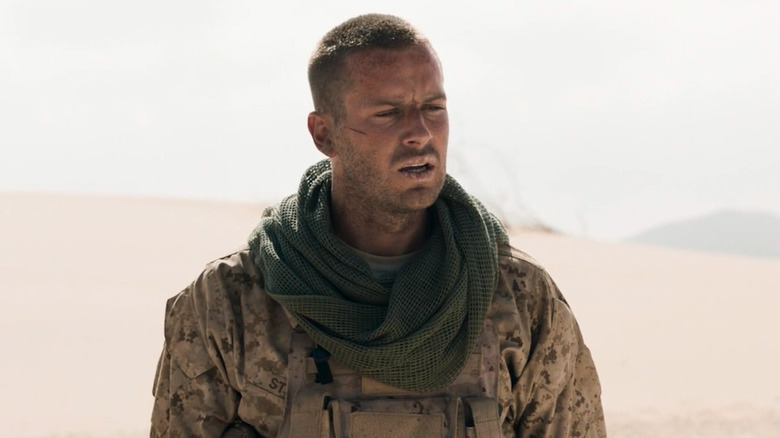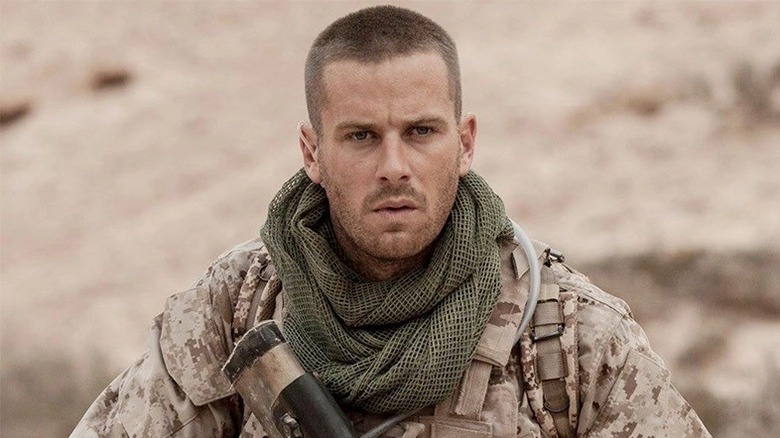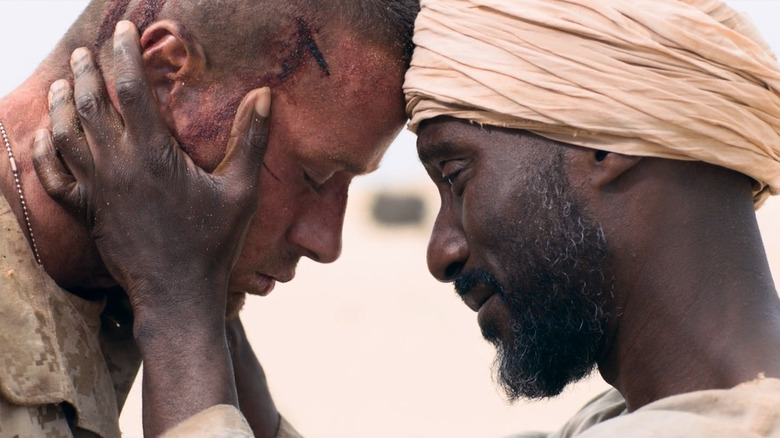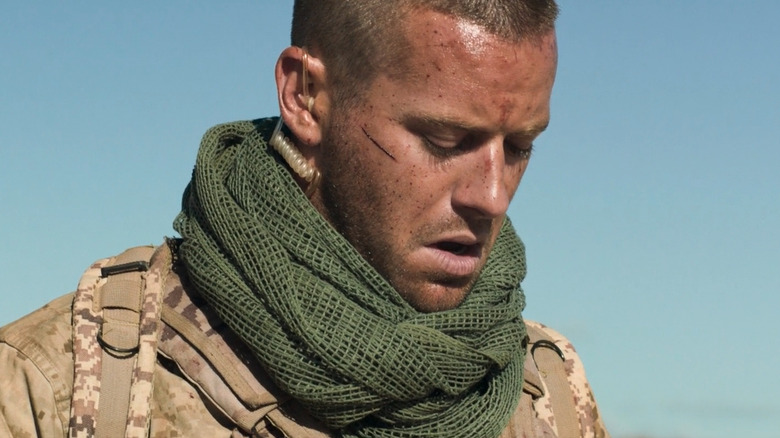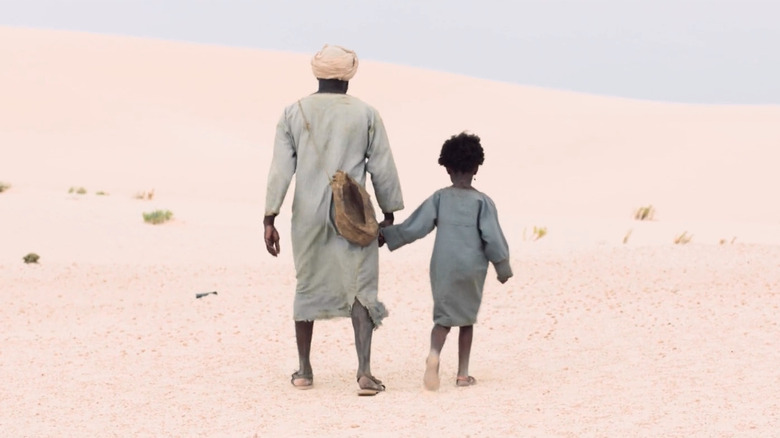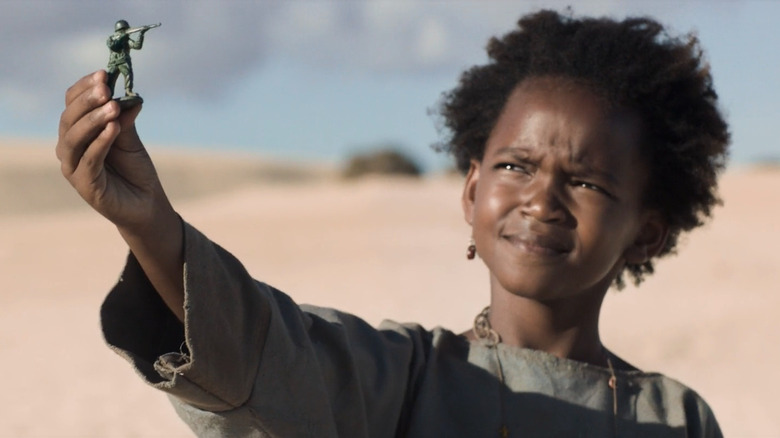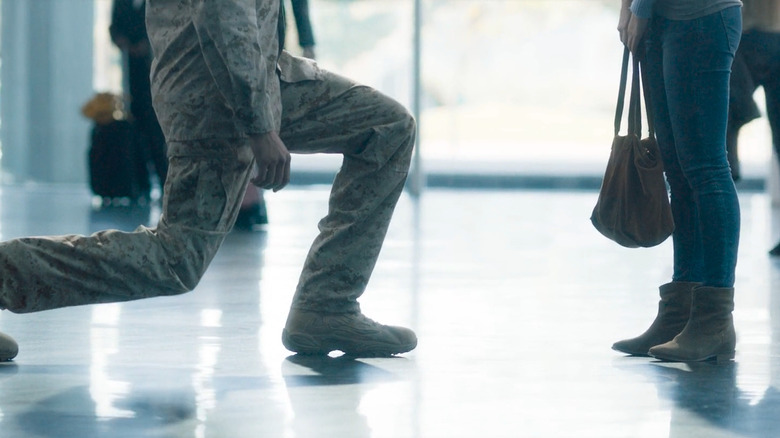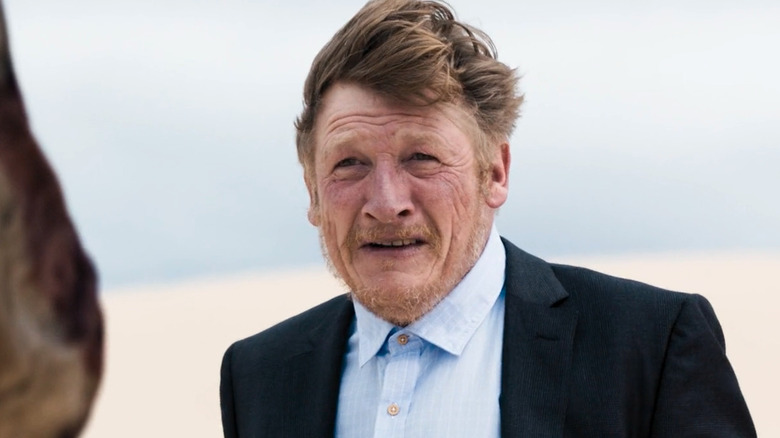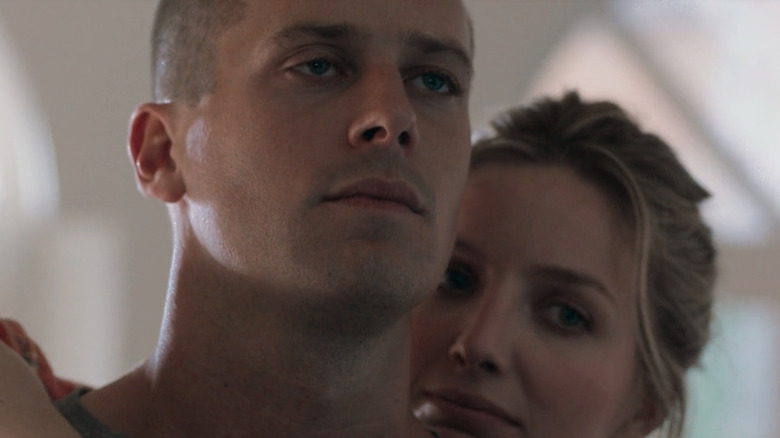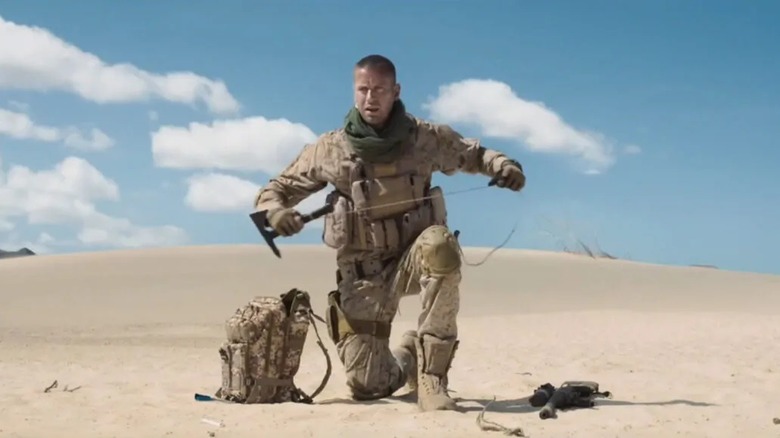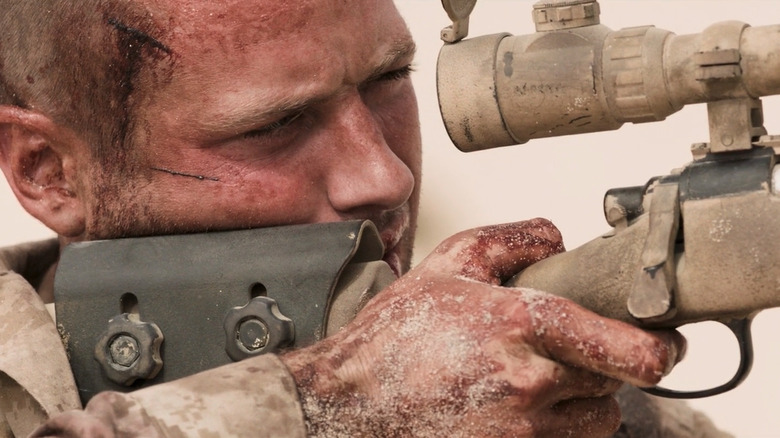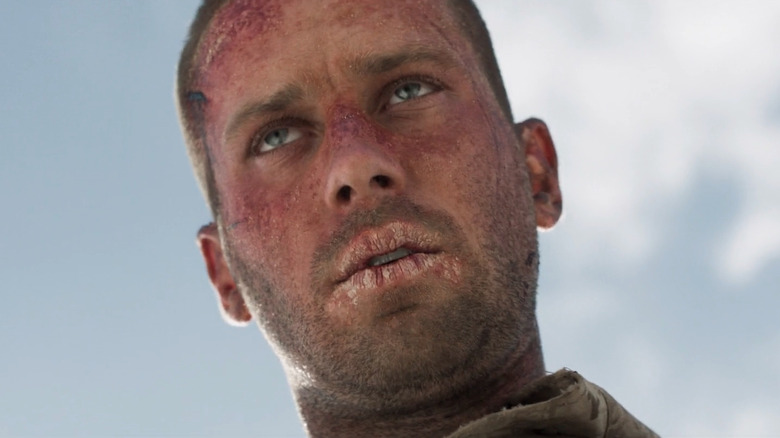The Ending Of 2016's Mine Explained
In the unforgiving Sahara Desert, a relentless battle for survival unfolds in the 2016 psychological thriller "Mine." Directed by Italian filmmakers Fabio Guaglione and Fabio Resinaro, the film stars Armie Hammer as a U.S. Marine sniper who steps on an active landmine and has no choice but to stay put, hoping that help will arrive. As hours turn into days, Mike's battle with the harsh and deadly desert intensifies. Low on food and water, and with little contact with the outside world, Mike's mental state quickly deteriorates.
As he comes to terms with his probable fate, Mike tries to deal with the inner emotional turmoil that he's refused to face for so long. From his difficult childhood and the death of his mother to the wedge he's driven between him and his girlfriend Jenny (Annabelle Wallis), it all comes to the surface as his chances of survival grow ever thinner.
Despite telling the story of one man stuck in one place for days, "Mine" features a surprising amount of twists and turns as it explores the human condition. A tale about the triumph of spirit, the film's ending shines a light on the inner battles waged by those grappling with lifelong trauma. There are also plenty of eye-opening moments that will leave you with a lot to think about.
What you need to remember about the plot of Mine
When "Mine" begins, we meet a pair of American Marines, expert sniper Mike Stevens and his spotter Tommy Madison (Tom Cullen), who are on a mission in North Africa. Camped out on a sand dune, the pair await orders regarding the assassination of a terrorist leader. When Mike realizes that their target is in the middle of a wedding ceremony — and may not even be the man they're looking for — he is hesitant to pull the trigger, as the situation seems to bring back a trauma from his past.
Unable to accomplish the mission, Mike and Tommy flee to a nearby town, but along the way they must traverse what Mike suspects is an abandoned minefield. Tommy is dismissive, mocking Mike's paranoia, especially considering his willingness to take on half a dozen men in a fight — a reference to a past incident we're not yet privy to — but winds up stepping on a mine, costing him his legs. At the same time, Mike appears to activate the switch of a mine himself and is stuck in place, unable to move or risk blowing himself up.
Fatally injured, Tommy takes his own life while telling Mike to find a way to stay alive. But, with Tommy having the only radio, and Mike unable to take another step, the odds of survival are slim.
What happens at the end of Mine?
After Mike is able to get hold of Tommy's radio thanks to some ingenuity, he's able to communicate with his superiors. Unfortunately, they cannot send help and recommend he attempt the so-called Shuman maneuver to get off the mine, which would give him a chance to save his life but would likely cost him his legs. However, an encounter with a native Berber (Clint Dyer) gives him hope that he might find a way out. While the Berber insists that Mike should just step off the mine and is sure he'll be fine, Mike isn't as optimistic.
Following a violent encounter that leaves him seriously injured, Mike accepts a hallucinogenic medicine from the Berber, who helps heal his wounds. Some of the visions Mike sees are more than just illusions created by his psyche: They're moments from his past that have long haunted him, and they help him come to terms with both his present situation and his troubled life. Ultimately, Mike realizes that to escape, one way or the other, he has to step off the mine and decides to take a leap of faith.
To Mike's astonishment, when he steps off the mine it doesn't explode, as it appears that the device beneath his foot wasn't what he believed it to be. In the end, Mike walks away with a new lease on life and a rejuvenated spirit, and when he arrives home, he reunites with the love of his life that he'd thought he'd never see again.
What was really under Mike's foot?
"Mine" has an unexpected twist ending. Not only is it revealed that the device under Mike's foot — the apparent mine that had kept him held in place for the entire film, threatening to kill him with the slightest movement — wasn't as dangerous as it seemed, but it wasn't even a mine at all. Earlier in the film, he'd used his combat knife to explore the device himself and was sure it was a deadly mine, the same kind that had killed Tommy. So, if it wasn't a mine, what was it?
Finding himself unharmed after stepping off what he thought was a mine, Mike digs beneath the sand to find out just what it was under his feet. As it turns out, it was little more than a tin can, similar in size and shape to the mines used across the desert. It's just a harmless piece of metal that never posed any danger at all. And, as strange as it seems, when he opens the can and looks inside, he finds a small plastic toy soldier, similar to the one he found lying in the dunes earlier in the film.
Who is the Berber and is his daughter real?
Mike has visions after ingesting a powerful mind-altering liquid given to him by the Berber, but that isn't the first time he hallucinates. At the end of the film we learn that when he was visited by the Berber's daughter — who gave him a canteen of water — he had been hallucinating, too. The Berber says that his daughter was killed years ago, blown up by one of the mines as they searched the dunes and removed them from the sand. They had been taking them out of the landscape and selling them to guerillas, replacing them with tin cans so that insurgents wouldn't know they'd been taken.
This is how the Berber and his family survived, making money from selling the mines. And it was his daughter's practice to carefully detect the mines with a small stick, and place a toy soldier in each tin can. On the day of her tragic death, the mine also took the Berber's leg, which he eventually replaced with a wooden one.
After taking the hallucinogenic healing water, Mike sees the Berber's daughter one more time, walking hand in hand with her father. But how did Mike know about her before the Berber had ever mentioned her, and how did he know about the plastic soldier she gave him in his vision? While Mike had discovered a toy soldier in the sand earlier, he had no knowledge of the little girl. Unfortunately, Mike's vision of her is left a mystery, and viewers are left to assume that the event was perhaps supernatural in nature.
What is the meaning of the toy soldiers?
The toy soldiers that the Berber's daughter shows to Mike during his vision are more than just a little plaything. These small figures are full of symbolism that might not be apparent at first but becomes clear with a deeper look. Early in the film, after arriving in the minefield, Mike discovers one in the sand and thinks its curious. This particular soldier is looking through binoculars into the distance. Of course, Mike's partner Tommy is a spotter, whose job involves looking through similar binoculars, and the discovery of the toy could be a foreshadowing of Tommy's death just minutes later.
The Berber's daughter produces two additional soldiers from her bag, both holding rifles aimed at their targets. One of them is half-kneeling — in a similar position that Mike finds himself stuck in throughout the film — and she uses them to play out a small allegorical scenario. Positioning them in a row, she topples the first soldier over (representing Tommy) while leaving the other alone, perhaps illustrating Mike's predicament — stuck in the sand. The appearance of the little green men could also be symbolic of soldiers whose lives are so mercilessly vulnerable, and who lose their lives to the horrors of war.
What the end of Mine means
Throughout "Mine," Mike has little to do while stuck standing on a mine other than examine his life. Looking back, he's able to take a hard look at the problems he has constantly been running from, and by the end of his ordeal, he's finally motivated to move forward. The ending of "Mine" shows how the struggle to overcome his fear of being blown apart by an explosive mirrors his fear of facing his own problems. When the Berber urges him to take a literal step forward and see what happens — good or bad — Mike learns that he must do the same in his life.
After unexpectedly getting off the mine with his legs intact, Mike is rescued and makes it back home to the United States. In the final shot of the film, he arrives at the airport and is greeted by Jenny in a tearful reunion, having realized that he's transferred his childhood trauma into his relationship with her, and has now moved past it. When he sees her, Mike takes the step he never could, proposing to her right there in the terminal. And, in an ironic twist of fate, he gets down on one knee to do it, adopting the exact same position he'd been stuck in throughout the film.
The truth about Mike's traumatic childhood
While Mike is stranded in the desert, we are shown glimpses into his past via a series of flashbacks. A big part of those flashbacks is Mike's father (Geoff Bell), who, as it turns out, is a major reason why he has been so troubled all of his life.
Mike recalls an incident from his childhood, when he was woken up by his parents fighting in the kitchen during the night. His father was drunk and arguing with his mother about feeling disrespected in his own home. It's clear that Mike's mother is at the mercy of an alcoholic and abusive husband, and she fears what he is capable of. Understandably, she doesn't want her son exposed to this kind of behavior. When Mike walks into the kitchen, his father sees him and becomes enraged. He proceeds to beat Mike's mother, and when little Mike looks on in horror, his father turns his abuse on him, challenging "Mikey" to fight him, saying "I'm right here." But Mike is a child and is unable to fight back.
At the end of "Mine," Mike sees a vision of his father in the desert, intercut with flashbacks of watching his mother die in a hospital bed. His father, dressed in a suit, appears before him, and Mike is able to finally summon the courage to fight back. He fires his pistol at his phantom father, exorcizing what's perhaps his greatest demon in the process.
What really happened between Mike and Jenny?
At the beginning of "Mine," we see Mike saying goodbye to his girlfriend Jenny. Over the course of the story, we are shown some of his happier days with her. But, during these scenes, there is often a coldness in Mike's eyes that we do not understand until the end of the film.
By the conclusion, after a series of flashbacks and moments where Mike reminisces about his love back home, we know more about his past. One memory shows us how he and Jenny met: She was a waitress at a bar where a group of U.S. servicemen had been frequenting, and one night while Mike was there he witnessed a group of them harassing her. When one of them taunted Mike — in a manner reminiscent of his father's abuse — he took the entire group on, which also explains Tommy's early comment about having no fear of fighting a group of thugs.
That same attack is also mirrored in the moment when Mike is forced to fight off a pack of wild dogs. The scene briefly shows the animals as men, fighting him the way they did at the bar. But it was Mike's lifelong struggle to overcome his childhood trauma that ultimately led him away from Jenny. In the end, it's a message that Jenny secretly recorded on his phone for him that helps Mike realize exactly what he must do. It's even implied that this message may have been some kind of good luck charm that has helped keep him safe.
What themes are explored in Mine?
"Mine" is a movie filled with hidden meanings. It explores a number of deeper themes about life, and not just in relation to a soldier stuck in a deadly situation. As the Berber says, we must keep moving forward. That doesn't just mean stepping off a mine, but also moving through tragedy, like the Berber did after the death of his daughter. Mike eventually learns to do the same, accepting his past and embracing a new future of uncertainty, something he'd never been able to do before.
When Mike first meets the Berber, he notices his unusual way of walking in a zig-zag pattern, which he later explains is a way of minimizing the chances of stepping on a landmine. But his walk is also a metaphor for the road we go down in life: Not every step we take has to be in a straight line, and our path can sometimes go in different directions, even as it moves us forward. As the Berber explains, even the wrong path can eventually take you home.
Ultimately, "Mine" is about conquering fear, finding freedom, and embracing your destiny. To do so, we must face our darkest moments and sometimes go through a trial by fire. In the end, it will lead us to the other side — if we can just take that leap of faith.
What did critics have to say about the ending of Mine?
"Mine" didn't get a wide release in the United States, but it did get reviewed by a number of major outlets. Unfortunately, it didn't seem to be appreciated by professional critics, some of whom took issue with its ending. Brian Tallerico of RogerEbert.com criticized the film for hitting the audience over the head with its themes. "'Mine' is unapologetically philosophical," he wrote. "We all have land mines in our life that we're not willing to step off, dude. It's a film in which a character literally says, 'Every day can be your last step.' Oh, really? Thanks."
Kate Erbland of IndieWire dubbed the film a "misguided 'Buried' knockoff," referring to the 2010 Ryan Reynolds film. Completely unconvinced by the script and Hammer's performance, Erbland felt that the movie's best moments were at the beginning. Though she appreciated the film's message that our biggest demons are inside us, she said that "when 'Mine' forgets that, the entire thing fizzles out."
According to Variety's Owen Gleiberman, Hammer was let down by the writing. "He conveys the anguish of Mike's desperation convincingly, but the character is so strong and decent that he rarely seems more than a vessel," the critic said. Meanwhile, Slant's Derek Smith found the revelations about Mike's life to be wholly anticlimactic, writing: "This painfully misguided use of the horrors of war in service of a simplistic metaphor for emotional turmoil is troubling enough, but coupled with the film's overt cultural insensitivity, it's clear that 'Mine' has absolutely no interest in the dilemmas or after-effects of war and occupation."
What have the filmmakers said about the ending of Mine?
Co-director Fabio Guaglione spoke about the ending of "Mine" during an interview with YouTuber Debbie Sanna, revealing that he and Fabio Resinaro set out to leave viewings feeling as though they had been on a journey through several genres. "It's more like an inner war movie," Guaglione said. "It starts like a war movie, then it becomes a survival movie, then a drama." He added that, by the end, the film becomes "some kind of dreamlike existential movie."
As for what the film means, and how the ending explores more than just a physical fight for survival, Guaglione said that it should be clear what the metaphor is by the time the credits roll. "In general terms, we wanted to talk about the relationship with fear," he explained. "So, sometimes you're stuck because you're afraid to make the step, because you think something terrible will happen."
The director went on to reveal that the color blue is important in the film: It pops up when Mike remembers moments from his childhood and again when he thinks about Jenny. "There are two meanings," Guaglione said when Sanna asked about the recurring use of blue in the film. "The first one is because we love astrology or quantum physics, and we also love tarots. So, from our knowledge of tarots, while red is always associated with what is visceral about human emotions and about Earth and passions, what is blue is more about what is divine and right on an ultimate level."
